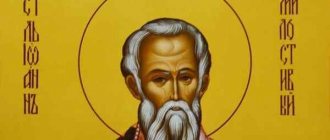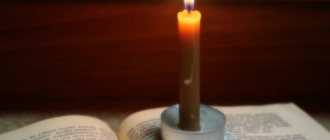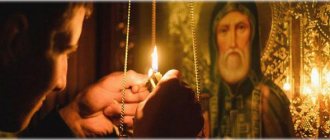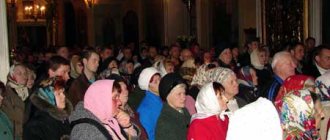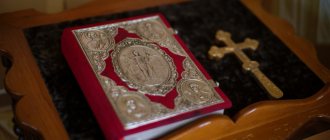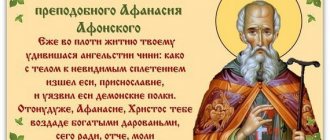The meaning of the Holy Spirit in Orthodoxy
The Holy Spirit is nothing more than the Third Person of the triune God - the Holy Trinity. The New Testament talks a lot about the Godhead. It is important to know that the Holy Spirit is not Jesus Christ or the Holy Father. This is a Deity sent by the Almighty to fulfill his will.
In the Holy Bible, the Holy Spirit is compared to breath, wind, life force, spirituality. He is invisible, incorporeal, but has enormous power. Thanks to the Holy Spirit, the Universe appeared, the Bible was written, people were able to understand the essence of the Christian religion, and comprehend the faith of Christ.
These are the invisible hands of God with which he creates. God's Spirit does not act arbitrarily, but at the command of the Almighty. This is God’s devoted assistant, proclaiming, guiding, and helping at God’s command. The Deity often descends on individuals and gives them Gifts (speech, revelations, powers) and supernatural abilities. In iconography, the Third Hypostasis is depicted as a dove soaring in the sky.
When a person is baptized, he remembers, along with the Father and the Son, the Holy Spirit. The third hypostasis is also considered God. To be baptized in the name of God's Spirit is to acknowledge the power of the Deity and its important role in carrying out the will of the Most High. At the Council of Constantinople in 381, that is, 250 years after the death of the last of the apostles, it was customary to consider the Holy Spirit to be the most holy Divine person. This is God existing everywhere. The Divine lives even in people who have converted to Christianity. It can be in the souls of millions of Christians, everywhere and at the same time. The importance of the Third Hypostasis is equal to that of the most holy God the Father and the Son.
The Holy Spirit convicts people of their sins. The deity addresses a person through his conscience, calling the believer to repentance. God's Spirit leads people to the Lord and holy Faith. The Divine lives inside every person who has converted to Christianity, helps the believer become a spiritual person, resist devilish temptations, and understand God's truth.
The main thing that Christians must remember is that prayers and calls addressed to the Holy Spirit cleanse souls from sin and sinful thoughts. Living with the holiest Divinity in your heart, you can count on the fulfillment of any desire. Faith in the Savior is unthinkable without receiving God's Spirit. It not only heals the human heart, but also helps the human mind to accept Divine truth.
Interpretation of the prayer “Heavenly King”
The Holy Spirit is mentioned three times in the Old Testament: twice in the book of the prophet Isaiah and once in the 50 Psalms. But in the New Testament the Holy Spirit appears much more often. In the form of a dove, he descended during the Baptism of our Lord Jesus Christ. Gospel characters spoke about him more than once. He came to the Apostles when they went to preach. Therefore, when pronouncing the prayer to the Heavenly King, there is no usual refrain of “rejoice” or “rejoice,” but there is the word “come,” which calls upon the third person of the Holy Trinity.
How to pray correctly
It is customary to turn to God using a prayer written by holy people. You can find the desired text in a prayer book (special collection). You can pray anywhere, but it’s better in a church, in front of a holy icon.
Before prayer, you need to sign yourself with the most holy sign of the cross, that is, cross yourself. To do this, you need to put three fingers of your right hand together (index, middle and thumb), and bend the ring and little fingers to the palm. When making the sign of the cross, you first need to touch your forehead, then your stomach, right and left shoulders. Having crossed yourself, you must say: “In the name of the Father and the Son and the Holy Spirit. Amen". This phrase is said every time a person is baptized, including before morning or evening prayer.
During the prayer ritual, it is advisable not to read the text, but to learn it by heart. God's Spirit is addressed through a prayer beginning with the words “Heavenly King.” The deity is asked to come and inhabit a person, and also to cleanse his sinful soul from filth, to save him from the devil’s machinations. Calling on God's Spirit helps in any difficult situation, for example, when they want to remember prayer words and tune in to a spiritual mood.
It is customary to start the morning with “Our Father.” Then you can read “Hail Mary”, “Glory to the Holy Trinity”, “Creed”, “Under Your Protection”, “Angel of God” and “Hymn to the Holy Spirit”. Throughout the day, believers pray before eating and after eating, as well as before starting any good and pleasing deed to the Almighty. In the evening, it is customary to read the same holy prayers as in the morning, and also a prayer text before going to bed, beginning with the words “Protect me, Lord.” At the end of the prayer requests, you need to say “Amen” and cross yourself again.
When making the sign of the cross, you should always put three fingers together. This is the sacred symbol of the Trinity. When being baptized, believers necessarily remember the Holy Spirit. Without addressing this Deity, the ritual of baptism is unthinkable. During every church service the Third Hypostasis is always remembered. Even the Savior spoke about the Holy Spirit before his crucifixion.
Christ turned to God the Father and asked him to send the Comforter to the believers. At that time people did not know this Deity because it was invisible. Only the disciples and apostles of the Savior understood the secret of the Third Hypostasis. Believers accepted the Divine, who was always with them, helping them not to stray from the righteous path and overcome all difficulties.
About prayer to the Heavenly King
Prayer to the Heavenly King is an appeal to the Holy Spirit, which is part of church worship. The Holy Spirit is the third Person of the Holy Trinity, the Life-Giving Lord. The name of the prayer comes from the first two words of its text. From Easter to Ascension this prayer is not read; its place is taken by the Easter troparion “Christ is Risen...”. From Ascension to the Day of the Holy Trinity, prayer is not said.
Prayer to the Heavenly King - stichera of the sixth tone on the stichera at the Great Vespers of Pentecost. It dates back to the 8th-9th centuries. The authorship of the prayer remains unknown. The exact date cannot be determined, but it is known that it did not exist under the Rule of Constantinople in the 9th century. You can also read the prayer to the Heavenly King privately, in home prayer.
We often hear that the King of Heaven is a very powerful prayer. It can be pronounced when a person:
- Asks for help in any matter.
- Cannot free himself from the power of sin.
- Experiencing a crisis of faith.
But the power of prayer depends not on what text is pronounced, but on the person’s faith. Ritual pronunciation of the text of a prayer without a true conversation with God does not have any “special” power.
Texts of strong prayers in Russian
Prayer requests addressed to God's Spirit save a person from sin and sinful thoughts. You can invoke the Deity by reading the prayer “To the Heavenly King.” Believers believe that a prayer request will help them cleanse and save their souls and begin a spiritual life.
About the fulfillment of a wish
In this prayer request, beginning with the words “Heavenly King,” believers invoke the Divine. Christians ask the Holy Spirit to come to them, cleanse their souls from sins, fill everyone’s life with joy and, most importantly, fulfill their deepest desires. A person can only wish for deeds pleasing to God. It is customary to read a prayer for the fulfillment of a wish only once in a lifetime.
“Heavenly King, come to me and help me fulfill my deepest desire (you should state your request). You are the Comforter and the Spirit of Truth, you fill the whole world with yourself. You are the Giver and Giver of life. Cleanse my soul from sins and fill it with joy. Amen".
“The Holy Spirit, illuminating all paths with His light and providing help in any trouble! May Thy instruction and blessing, Thy help and great mercy, not pass me by, humbly asking the servant of God (name). I pray for forgiveness of my sins and for the cleansing of my soul from all evil and wickedness. I thank You for Your saving and I glorify You ever and ever. My gaze will not turn away from Your deeds, my lips will not tire of offering prayers of thanksgiving to You. I want to be near You and carry Your Word forever. Let my need disappear and my need (desire) be fulfilled according to Your will. In the name of the Father, and the Son, and the Holy Spirit. Amen".
"King of Heaven"
In the most holy prayer, beginning with the words “To the King of Heaven,” believers call upon God’s Spirit to come into their lives. Once upon a time, the Third Hypostasis descended to the Savior at the moment of his baptism, and also to his apostles, who preached the word of God. Believers call the Spirit the real King, because he invisibly reigns over the world. For Christians, he is also a Comforter, since people turn to him in difficult moments of life. The third hypostasis radiates the truth, which is the only salvation of the soul. With the help of prayer, believers are cleansed of sins, and their lives are filled with spirituality.
“Heavenly King, our Comforter, Soul of Truth, You are everywhere and can fulfill everything, You are good treasures and the Giver of all life. Come and dwell in us to cleanse our souls from various filth. Save, Lord, Almighty, our souls. Amen".
Another prayer to the “King of Heaven”
Believers call on the Holy Spirit and ask him to guide them through life, to be a leader and teacher. Christians pray that the Divine will teach them what to do and how to live. People, turning to the Third Hypostasis, ask to tell them their commands and undertake to fulfill them. Believers, in conversation with the Divine, sincerely pray to teach them to do God's will.
“Lord, Heavenly King, Spirit of truth and soul of my soul, I worship You and pray to You: instruct me, strengthen me, be my guide and teacher, teach me what I should do. Tell me, Lord, all Your commandments, but I promise to fulfill them and will lovingly accept everything that You send me. I ask only one thing from You: teach me to always do Your will. Amen".
For fear and anxiety
When a person is overwhelmed by fear, worry, and unexplained anxiety, he can call on God's Spirit to help. In prayer, believers ask that the Divine come and dwell in them and cleanse their souls from sinful filth. With the help of a prayer request, you can repent and live, performing good and pleasing deeds to God.
“Holy Soul! Fill the entire universe with yourself, and give life to everyone, but move away from bad people, I humbly pray to Thee: do not disdain the uncleanness of my soul, but come and dwell in me and cleanse me from all sinful filth. With Your help, I will live the rest of my life in repentance and doing good deeds, and so I will glorify You with the Father and the Son forever and ever. Amen".
Before starting any business
Before starting a work pleasing to the Almighty, it is recommended to call on the Holy Spirit and ask him for help. In this case, the most holy prayer is read, beginning with the words “To the Heavenly King.” The deity is asked to come and inhabit a person, cleanse the soul from sin and save from the fall. This prayer helps, with the support of the Higher Powers, to boldly begin any business.
“Heavenly King, Comforter, Soul of truth, You are everywhere and can fulfill everything, You are good treasures and the Giver of life, come and dwell in us, and cleanse us from all filth, and save our souls. Bless, Lord, and help me, a sinner, to complete the work I have begun, for Your glory. Lord Jesus Christ, the Only Begotten Son of Your Father without beginning, for You speak with Your most pure lips, that without Me you cannot create anything that exists. My Lord, Lord, with faith in my soul and heart spoken by You, I fall into Your goodness: help me, a sinner, to complete this work, which I have begun, for You, in the name of the Father and the Son and the Holy Spirit, through the prayers of the Mother of God and all Your saints . Amen".
On Trinity
Prayers said on Trinity Day have enormous power. Prayer requests made on such a day help to fulfill any desire, as well as to ask for forgiveness for one’s sins and to cleanse oneself of all filth.
In the most holy prayer, beginning with the words “Heavenly King,” believers call upon God’s Spirit to come and give them the purification of their souls. Christians ask to enlighten their minds, revive their consciences, renew their hearts, and fill them with joy. Believers pray before the Holy Trinity that no sinful desires and passions remain in their souls. People ask the Divine to strengthen their faith, grant them patience and love. Christians pray to guide them on the righteous path, to protect them from devilish temptations, and to give them the opportunity to live their lives according to Christian rules.
“Heavenly King, all-good Comforter, Soul of truth, who comes from the Father God and rests in the Son. Come and grant us unworthy the purification of our souls. O All-Good One, do not disdain our sins and heal us with your anointing. Enlighten our minds so that we realize the vanity of the world around us, revive our conscience so that we understand that we need to do good, correct and renew our hearts, filling them with joy.
Let no evil and worthless desires remain in our souls, tame our carnal sinful lusts and passions. Strengthen our faith and may not the precious image of God be darkened in our minds. Drive away from us the spirit of idleness and despondency, do not let us get carried away by idle talk. Grant us the spirit of patience and love, humility and meekness, truth and sincerity. Guide us on the righteous path of God’s commandments and protection from demonic temptations. Lead us along the path of life so that we can avoid any fall into sin and be worthy of a Christian death after repentance. Glory to Thee Holy Spirit and glory to the Holy Trinity."
Origin of Prayer
The Trisagion occupies an important place among Christian prayers. Nowadays, these lines are known to every Christian. They are read during services and when turning to God independently. The Trisagion has been known since early Christianity, as mentioned by John Chrysostom. The story of how this prayer entered Orthodox worship is known from an ancient Byzantine tradition.
According to legend, in 438 or 439, during Lent, a terrible earthquake occurred in Constantinople. People came out of their houses into the streets and joined religious processions and processions. The priests at the head of the processions asked God to grant salvation to the townspeople and stop the shaking of the earth. Among the frightened people was a boy to whom the incredible happened.
Divine forces raised the child to heaven, where the wondrous voices of angels were heard singing the Trisagion. When the boy found himself on the ground, he hurried to inform the adults about what had happened. Information immediately reached the Byzantine patriarch, who ordered the praise the child heard to be sung in the streets so that God would have mercy. And a miracle happened: the earthquake stopped.
In gratitude to the Lord for saving the city, the powerful Empress Pulcheria ordered the reading of the Trisagion during divine services. Later, during the Ecumenical Council, this decree was consolidated.
There is another opinion about the origin of prayer. A certain monk Job explains the wording of the text by combining two quotes from the Holy Scriptures and a petition for mercy. It is implied that the appeal to the Trinity was known before the events described in the legend. One way or another, the sacred text entered the Orthodox and Catholic tradition.
Supporters of the heretical teachings of the Monophysites tried to distort the text. At some point, they managed to seize power in Byzantium and impose their order of worship. However, after a short time they were defeated, and the heretical rules were canceled. The Trisagion was originally written in Greek; the Russian Orthodox Church reads a literal translation.


